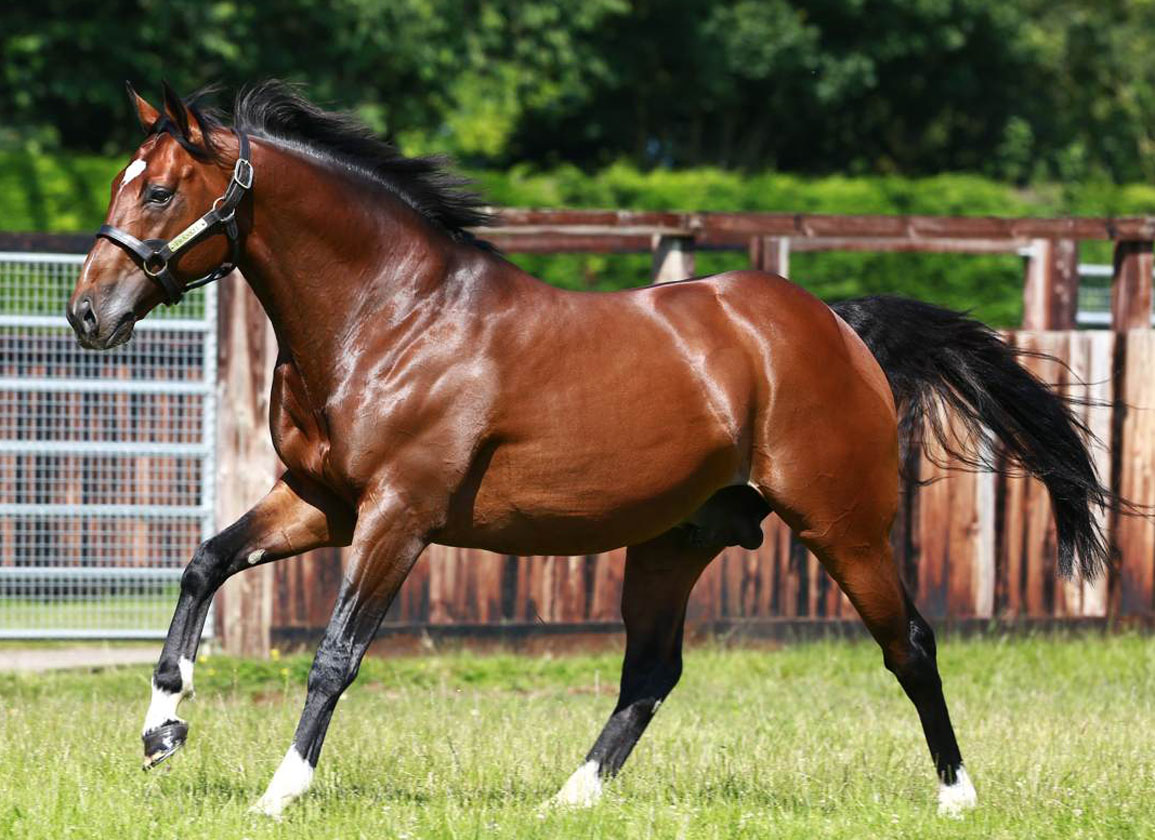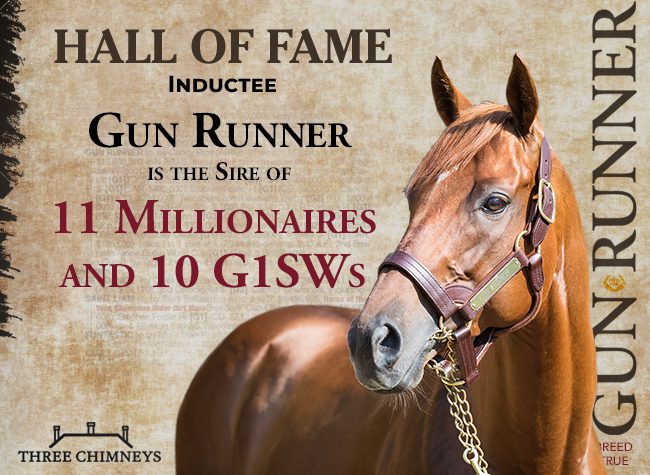By John Berry
Sadler's Wells, winner of the G1 Eclipse S. during a tough campaign as a 3-year-old in 1984, didn't take long to establish himself as an outstanding stallion (siring two Dewhurst Stakes winners, ie dead-heaters, in his first crop and thus swiftly making his aptitude for his second career clear) but for quite a long time the jury was out as to his effectiveness as a sire of sires. Ultimately, though, any such doubts were utterly dispelled. His best son on the racecourse, Montjeu (Ire), became a terrific stallion and then the horse who won the Derby, Irish Derby and King George And Queen Elizabeth S. two years after Montjeu won the Prix du Jockey-Club, Irish Derby and Prix de l'Arc de Triomphe, Galileo (Ire), became an even greater one. Galileo, born when Sadler's Wells was aged 17, truly became his father's heir. The consequence of this was that the question of who would become Sadler's Wells's heir was replaced by a next-generation query as to who would become Galileo's heir?
Galileo, like his father, was an immediate star at stud, notwithstanding that his first juveniles did not make anything like the impression that had been created by Sadler's Wells's first bunch of 2-year-olds. By the time that Galileo's first crop had been racing for two seasons, he had sired two Classic winners, Nightime (Ire) having won the Irish 1,000 Guineas and Sixties Icon (GB) having taken the St Leger, as well as a Dewhurst Stakes winner (his second-crop son Teofilo (Ire)). In retrospect, Sixties Icon's St Leger can be said to have foretold the subsequent changing of the guard which would later see Galileo inherit his father's mantle: Galileo sired the first three colts across the line while the fourth and fifth place-getters were sons of Sadler's Wells.
Things progressed nicely from there, with Galileo's third crop headed by New Approach (Ire) who became his father's second Dewhurst winner and the first of his five (so far) winners of the Derby. With such a galaxy of stars, for a few years it seemed as if it would be hard to provide a definite answer to the identity of Galileo's best son or daughter, never mind his best sire-son. However, a member of Galileo's sixth crop provided so clear-cut an answer to that one that we knew that, however many crops the great horse went on to produce afterwards, Frankel (GB) was and always would remain the best racehorse sired by Galileo. As Sir Henry Cecil, a man whose natural modesty had led him spend his career shying away from superlatives and avoiding making extravagant claims on behalf of his charges, was eventually forced to concede after Frankel's final race, that Frankel wasn't just the best horse whom he had ever trained nor even the best horse whom he had ever seen, but “probably the best horse anyone has ever seen”.
That was all well and good, of course; and Frankel's flawless 14-from-14 racing record certainly ensured that he was given every chance when he retired to stud by virtue of stellar early books of mares. But when any horse ceases racing and retires to stud, the clock is turned back to zero. Success as a racehorse implies a strong possibility of success at stud, but it certainly doesn't guarantee it, irrespective of how well supported a young sire may be. In fact, there can be an element of tall poppy syndrome when people contemplate the likelihood of a great racehorse excelling at stud. One will always find people ready to peddle the myth that top-class fillies/racemares are unlikely to become good broodmares, and one can always find people who will brush an outstanding colt off as having been 'a freak', unlikely to display similar excellence as a stallion. In Frankel's case, of course, an element of that is inevitably true because it is nigh on impossible that he could sire a horse as talented a racehorse as he himself had been. But, even so, in retrospect it was folly to predict anything but stardom for Frankel the stallion.
We do, of course, have the benefit of hindsight, but now that we have had time to digest the evidence of the 2021 racing season (which ended with Frankel as champion sire of Great Britain and Ireland, relegating Galileo to the runner-up position) the conclusion is inescapable: Frankel has stepped into his father's shoes as seamlessly as Elisha took up Elijah's mantle. If only the correlation between racing ability and success at stud was always so strong! It is going to be very interesting to see how things go from here, not least because, although Galileo may have died in July, there remains a handful of seasons in which he will still be sufficiently well represented to have a realistic chance of increasing his haul of General Sires' Championships.
Sadler's Wells holds the record for the most British/Irish sires' titles. His final year as champion sire, 2004, saw him take the title for the 14th time, passing the record of 13 (which he had equalled the previous year). The magnitude of the achievement is shown by the fact that he was breaking a record which had stood for over 200 years, the previous record-holder Highflyer (GB) having won his 13th and final championship in 1798. Galileo's total of championships currently stands at 12, courtesy of his being champion sire in 12 of the 13 seasons from 2008 to 2020 inclusive. (The sole interruption in his reign came in 2009 when his fellow Coolmore resident Danehill Dancer (Ire) topped the table).
Many of us had blithely assumed that Galileo would remain as champion sire for the next few seasons, would equal Sadler's Wells's total in 2022 and would pass it in 2023. The season just ending has blown that assumption out of the water, with Frankel winning the sires' championship almost as emphatically as he used to win his races. He will end the current season with progeny earnings in Great Britain and Ireland in excess of £5.25 million, not far off £1.5 million clear of the sum earned by Galileo's offspring. In fact, third-placed Dubawi (Ire), fourth-placed Sea The Stars (Ire) and fifth-placed Dark Angel (Ire) are all set to finish considerably closer to Galileo than Galileo will finish to Frankel. Looking ahead, it is, of course, very possible that Galileo could regain his crown in 2022, although the current ante-post market for the Derby is not encouraging in that respect: five horses, including two trained by Aidan O'Brien, are at odds shorter than 25/1 for the great race and none is a son of Galileo, which by recent standards is an almost unthinkable situation.
What the next 12 months will bring for Frankel is also, of course, impossible to predict. But the one thing which we can say is that, if the past is any guide to the future, his career will continue to thrive. What he has achieved so far, even allowing for the fact that he was blessed with first-class support from the outset, has been phenomenal.
Frankel's achievement which has been given the most air-time is perhaps the fact that this year he became the fastest sire to reach 50 Group winners in history. Obviously this record is meaningless compared to what stallions achieved up to and including the 1980s, when it was still the norm for stallions to cover no more than 45 mares each season and to be restricted to one stud season per year (because dual-hemisphere shuttling had not yet become an accepted practice). However, the explosion in the size of stallions' books and the widespread acceptance of shuttling took place over 30 years ago now, and there have been a lot of good sires, including Galileo obviously, whose stud careers started in the last 30 years. Furthermore, Frankel has never shuttled, although obviously he has been able to gain extra representation by covering a limited number of mares at Banstead Manor to southern hemisphere time to produce progeny to race in the Antipodes or South Africa.
An obvious example of this type of mare is Harlech (GB) (Pivotal {GB}) whom he covered in the late summer of 2016 and who produced Hungry Heart (Aus) in August 2017. Hungry Heart did plenty to boost Frankel's worldwide progeny earnings in 2021, taking the G2 Phar Lap S. at Rosehill in March, then both the G1 Vinery Stud S. at Rosehill and the G1 ATC Australian Oaks at Randwick in April. These were the first two of the 14 Group/Grade 1 races won by sons and daughters of Frankel in 2021, won by eight individual horses and spread over six countries. In fact, it is a remarkable aside to Frankel's sires' championship that fewer than half of the top-level triumphs recorded by his progeny during the year actually counted towards the title. In fairness, it has obviously helped that his two brightest stars this year have both been trained in England: Adayar (Ire) and Hurricane Lane (Ire), whose wins between them have included the Derby, Irish Derby, King George And Queen Elizabeth Stakes and St. Leger.
Overall, one has to say that Frankel's concentration of top-level triumph is remarkable. For a stallion who has recently recorded his 50th individual Group winner, to have sired as many as 20 Group 1 winners (as he has) shows an abnormal concentration at the elite level of the stakes programme. But that's Frankel: his statistics go way beyond what in the modern world is regarded as an achievement. Historically, it used to be the case that a figure of 10% stakes winners to foals was the benchmark of a very good stallion, but the onset of big books meant that reaching the 10% mark came to be regarded as more or less unattainable. Frankel, though, has reached it comfortably. At the time of writing, and including only horses currently aged two or more, Frankel has sired 777 foals, 548 runners, 361 winners of 896 races, and 83 stakes winners of 154 stakes races, including 57 Group winners of 95 Group races. These statistics produce some stunning percentages: 10.7% stakes winners to foals, 7.3% Group winners to foals, 15.1% stakes winners to runners, 10.4% Group winners to runners. Ultimately, of course, the percentages for these crops will be even higher than this as plenty of the current two-year-olds who will turn out to be stakes performers have not yet run, never mind won at stakes level.
It would be premature to say that Galileo's ultimate total of sires' championships has been reached, or that Frankel's progeny achievements over the next, say, three seasons will outshine what the sons and daughters of Galileo will achieve in the same period. However, we can say that Frankel's annus mirabilis in 2021, following on from the very successful seasons which he had enjoyed in every year from 2016 (when he was represented by his first crop of 2-year-olds) onwards, an heir apparent to Galileo has definitely emerged. The fact that that horse happens to be the one who was himself the best racehorse ever sired by Galileo merely adds a further layer of quality for lovers of top-class thoroughbreds to savour.
Not a subscriber? Click here to sign up for the daily PDF or alerts.






